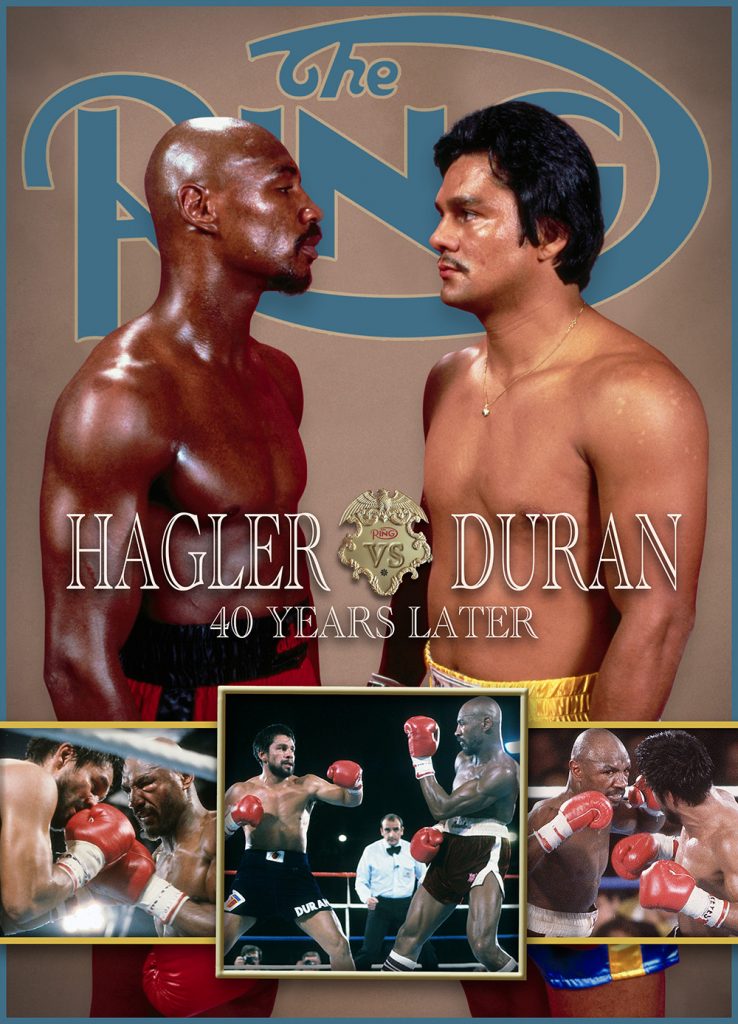Best I Faced: Vince Phillips
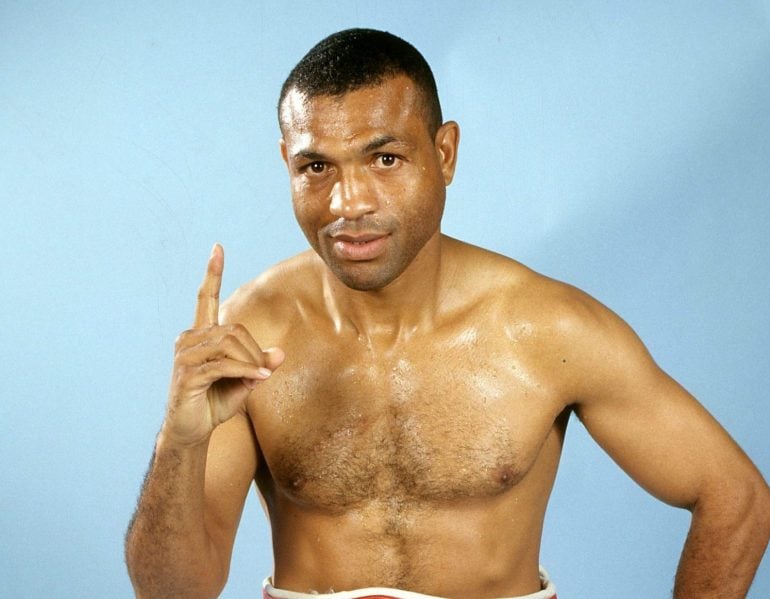
Heavy-handed Vince Phillips upset a lot of plans when he shocked Kostya Tszyu to become the IBF junior welterweight titleholder in the mid-1990s.
Phillips, who was the youngest of 12 children, was born in Pensacola, Florida on July 23, 1963. His father worked for the water company and his mother was a bartender.
“I didn’t have to worry about much,” Phillips told The Ring. “They called me Mr. Vince when I was little. Everybody gave me money, toys, I was spoiled.
“[Pensacola’s in the] country, so there was prejudice but the people I was around was family. If we got into a fight my mother would whoop me and him and his momma would do the same as my momma.”
Phillips enjoyed baseball in school and had aspirations of one day playing America’s favorite pastime for a living but he was never far from trouble.
“Two guys were messing with a friend of mine’s sister, after school I caught them in the games room,” he said. “I punched one and the other ran. I ran after him and the police were coming when the police seen me hit him. They said I had a good right hand and should go into boxing. I didn’t pay it no mind.
“Then this other guy was playing football and kept hitting me with the elbow, I said, ‘Hit me one more time and I’m going to punch you.’ He elbowed me again. They said, ‘No fighting.’ There’s a little square and they put us in there and I hit him with a good shot and knocked him down. That was on a Friday and they said he was in hospital for the whole weekend.”
Things came to a head when Phillips was in the ninth grade.
“I made a basketball shot and white guy said, ‘Good shot, n—–!’ So, I ran and beat him up,” he recalled. “The Dean looked at me and said ‘What’s your name?’ I said ‘Vince Phillips, Sir.’ He said ‘Oh my God another f— Phillips! If you do three things wrong, you’re not expelled from this school, you’re expelled from every county school in the district, period.'”
It was difficult for Phillips to go to school from that point so when the opportunity came to go north to New York, he did so.
“My mother wanted me to graduate and go to college,” he told The Ring. “I went with my niece to New York City one month before my 15th birthday. My niece couldn’t ride by herself, so they had me ride with her. I rang my mother and told her, ‘You might as well let me stay here and go to school, I can’t go there.'”
After graduating, Phillips, who was now 18, returned home and was cut from the local baseball team. A friend suggested he visit Roy Jones Sr.’s gym. Jones was known to be a no-nonsense character and matched Phillips tough, sparring him with professionals.
At the age of 20, Phillips enlisted in the Army and after basic training was based in Ft. Riley, Kansas.
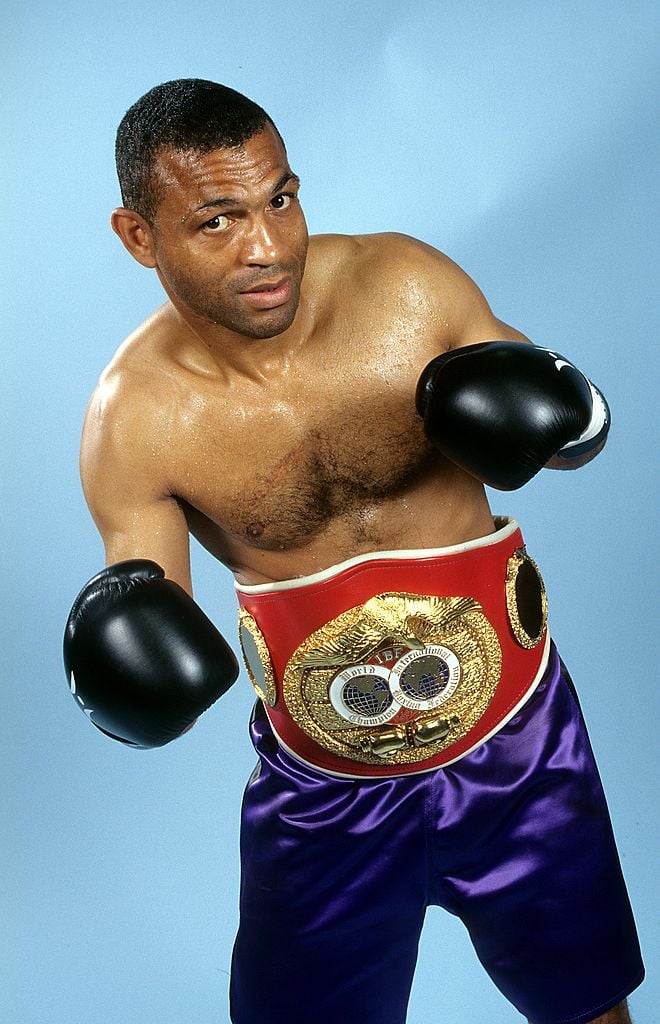
Phillips poses for a portrait with his IBF 140-pound title belt in 1997 in Atlantic City. Photo by: The Ring Magazine via Getty Images
“They had a boxing trial and I made the team and never looked back,” said Phillips, who went 90-10 as an amateur. “I won a tournament where all the divisions in the Army fight, whoever wins that goes to the All-Army camp and in that you find out who is the best in the military. I won that tournament. I was on the All-Army team.”
Phillips represented America in the 1986 World Championships in Reno, Nevada, losing in the preliminary stage of the tournament.
The Florida native, who left the Army at 24, vividly remembers a conversation with a good friend of his, who was also in the services.
“[Future IBF junior featherweight titlist] Kennedy McKinney told me in March of 1987, he’s going to the Olympics like Sugar Ray Leonard and I said, ‘I’m going to get out of the Army and do it the hard way like Marvin Hagler,'” he recalled. “I should have listened to him because I didn’t know how valuable it was winning a gold medal.”
In civilian life he began to smoke crack cocaine, though would stop a week before his fights.
Phillips turned professional on a Top Rank card, stopping Octavio Guardado in two rounds in February 1989. He got his career off to a good start and stayed unbeaten.
“I was 28-0 (19 knockouts) when I was smoking, I got popped and they said if I got caught again, I’d get a suspension from boxing,” he said. “So, I stopped for 12-and-a-half years. I got my first loss six months later to Anthony Jones on a cut.”
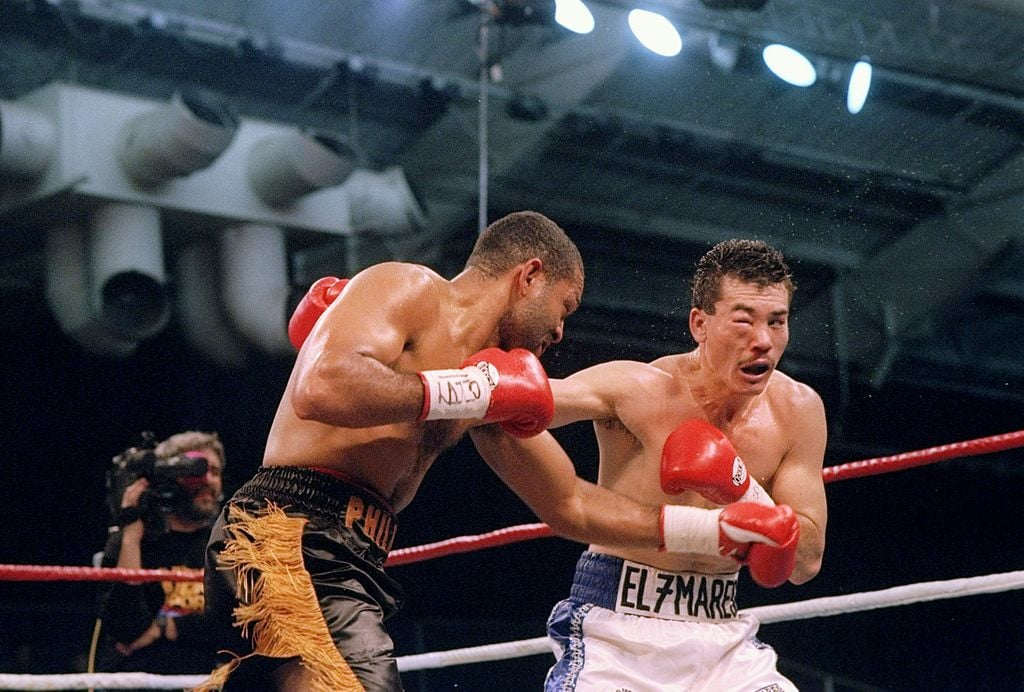
Vince Phillips rebounded from his first loss with a fourth-round stoppage of Jose “Shibiata Flores in Las Vegas. Photo by Holly Stein/Allsport/GettyImages
Phillips got back to winning ways and met WBA welterweight titlist Ike Quartey in St. Maarten in April 1996.
“When I fought him, I wasn’t prepared mentally,” explained Phillips, who was stopped by the natural welterweight in three rounds. “I took an overdose of somebody else’s pills two weeks before the fight. A guy said it would help me. The morning I woke up, I was very numb, I didn’t realize what was going on. I couldn’t function. They took me to the hospital and they said I had an overdose. I still fought, though.
“If I was 100 percent, I would have whooped Ike Quartey’s ass. If I was more discipled to my career and stayed ready instead of got ready, I’d have whooped a lot more butt. I didn’t know how good I was.”
After scoring two comeback wins, Phillips lost a 10-round split decision to 1988 Olympic bronze medalist Romallis Ellis in a welterweight bout in January 1997. At 33, it looked like time and opportunity had passed him by.
However, his next fight came at junior welterweight, a weight class he had never lost in at that point in his career. Phillips met IBF 140-pound ruler Kostya Tszyu in Atlantic City in May 1997. It was supposed to be a tune up fight for Tszyu ahead of a superfight with Oscar De La Hoya. It proved to be anything but.
“I was ready for Kostya. I trained 13 weeks for him,” recalled Phillips, who scored The Ring Magazine’s Upset of the Year. “When I started hitting him in the body, that’s when he started breaking down in the seventh round. I stopped him in the 10th. I was happy to win it, but I wasn’t overwhelmed. I should have been more alert know I’m champion of the world now. I didn’t function like that and that’s why I didn’t become a superstar fighter.
“We both went to hospital, I had a deep cut [Phillips had 9 stitches over his right eye], he was in one room and I was in the other. I went back to hotel and enjoyed myself with my fiancée at that time.”
Phillips’ first defense could have been a rematch against Tszyu.
“My agent, Akbar Muhammad, was such a bull-headed guy, when they offered me $200,000 to fight Kostya Tszyu in a rematch, Akbar said, ‘No, he wanted a million.’ I should have got half a million because they only paid me $45,000 for the first fight,” he said.
Phillips instead beat Micky Ward (TKO 3), former IBF lightweight titleholder Freddie Pendleton (TKO 10) and Alfonso Sanchez (KO 1), for who he made a career high $385,000 purse, in subsequent title defenses.
That followed a spell of 11 months of inactivity and trouble was brewing.
“[The IBF] said they were about to strip me, so I called [then IBF President] Bob Lee and he said Don King wants you to fight [Terron Millett”], he recalled. “He had Don King on the phone and put him on a three way [phone call.] Don gave me six weeks to get into shape, I was 50 pounds overweight. I went to Florida to start training. I wasn’t in shape, I lost 50-pounds and when I got on the scales they said, Phillips 140-pounds. My fight was just to make weight.
“The day of the physical before the fight, the doctor told me I lost too much weight, and I shouldn’t fight and I’ve got no strength and he was right. I couldn’t find the right food to eat. All I could find was Pizza in New York. I had no strength at all. When he hit me with a right hand in the third round before the bell rang, it felt like a sniper shooting me. I looked up in the air, bam, I’m down, I got up, went to my corner and sat down with my trainer. In my mind, I said, ‘I’ve got to fight now. They stopped the fight in the fifth round. They knew if the fight went into the late rounds it was going to be tougher and they said they wouldn’t give me a rematch.”
After some time out, Phillips got back in the win column before he went back up at welterweight and lost a lopsided 12-round unanimous decision to future two-weight world champion Vernon Forrest.
Phillips stayed active and gave a spirited losing effort against two-time world title challenger Ray Oliveira (MD 12) and former WBA 140-pound titleholder Sharmba Mitchell (MD 10) in the early 2000s.
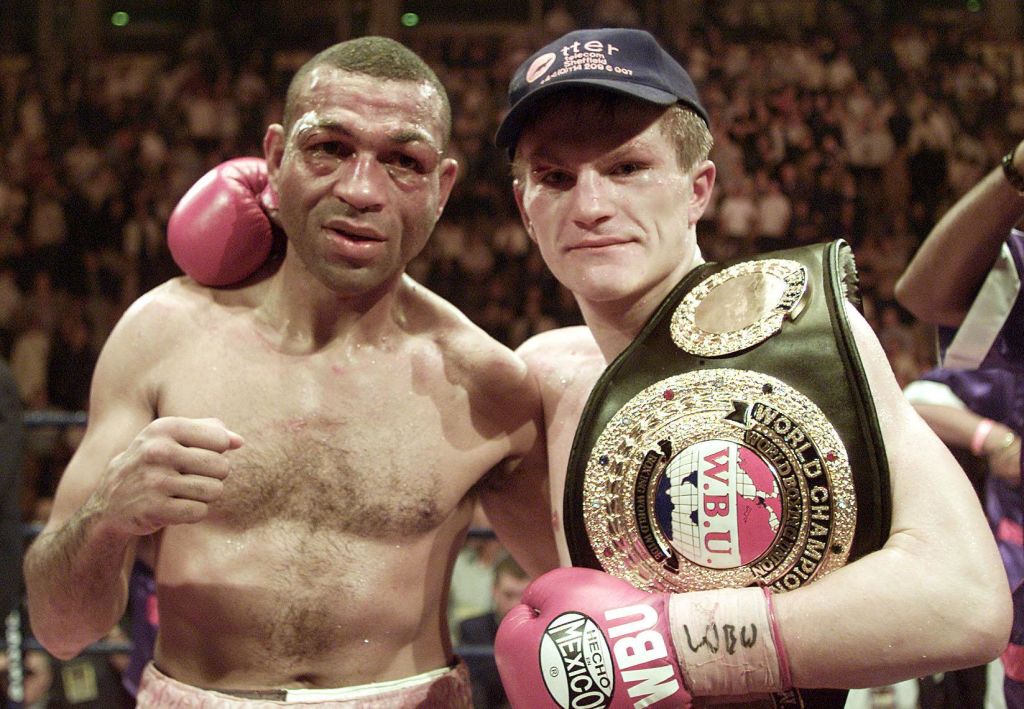
Ricky Hatton celebrates his points victory over a well-past-his-prime Vince Phillips at MEN Arena in Manchester. Photo by Nick Potts – PA Images/PA Images via Getty Images
Approaching his 40th birthday, Phillips travelled to Manchester, England to face rising star Ricky Hatton in April 2003. Phillips was embroiled in a dispute over unpaid child support and was relying on his purse to make good on his debts. He threatened to pull out over wranglings with the contract. Ultimately, he fought and although he lost a wide 12-round unanimous decision and gave a good account of himself.
He was used as a stepping-stone over the next couple of years before retiring with a record of (48-12-1, 34 knockouts) in 2007.
Phillips, now 60, has five children and lives in Baldwin Hills, Los Angeles, where he prefers to keep to himself. He was inducted into the Nevada Boxing Hall of Fame in 2022.
“I’m not doing anything; I do whatever I want to do,” he said of his life today. “I’m going to get back in the gym and get some clients. I’ve got money coming in, don’t worry about that.”
Phillips graciously took time to speak to The Ring about the best he fought in 10 key categories.
BEST JAB
Ike Quartey: He has a straight, arrow jab. His jab was on point.
BEST DEFENSE
Vernon Forrest: He was tall, lanky and I guess he saw what I was doing. He has good defense.
BEST HANDSPEED
Sharmba Mitchell: His handspeed was pretty good. I had to focus a little more on his handspeed than any other fighter fought.
BEST FOOTWORK
Mitchell: He knew how to move pretty fast. He used the ring very well. I had to catch up to him.
SMARTEST
Forrest: He was very careful about how he fought me. He moved; he knew I had to get inside and he was smart because he didn’t let me get inside too much.
STRONGEST
Quartey: I could feel his strength because he was a welterweight and I was a natural junior welterweight.
BEST PUNCHER
Quartey: It was a strong shock effect, it caught me. I felt I was hurt but I didn’t realize how hurt I was. Kostya’s power wasn’t as powerful as the writers talked about. Micky Ward’s body shots were OK, I took it. It was better than Ricky Hatton’s, I know that much. I didn’t really feel Ricky’s power.
BEST CHIN
Kostya Tszyu: He stood up to what I was giving him until I broke him down to the body. I hit him with a lot of right hands.
BEST BOXING SKILLS
Forrest: He’s got height, reach and used it to the best of his ability. He was a tough puzzle to solve.
BEST OVERALL
Forrest: I couldn’t figure him out. I couldn’t catch him. He was well-rounded. He was a clever fighter.
Twitter@AnsonWainwright
SUBSCRIBE NOW (CLICK HERE - JUST $1.99 PER MONTH) TO READ THE LATEST ISSUE
